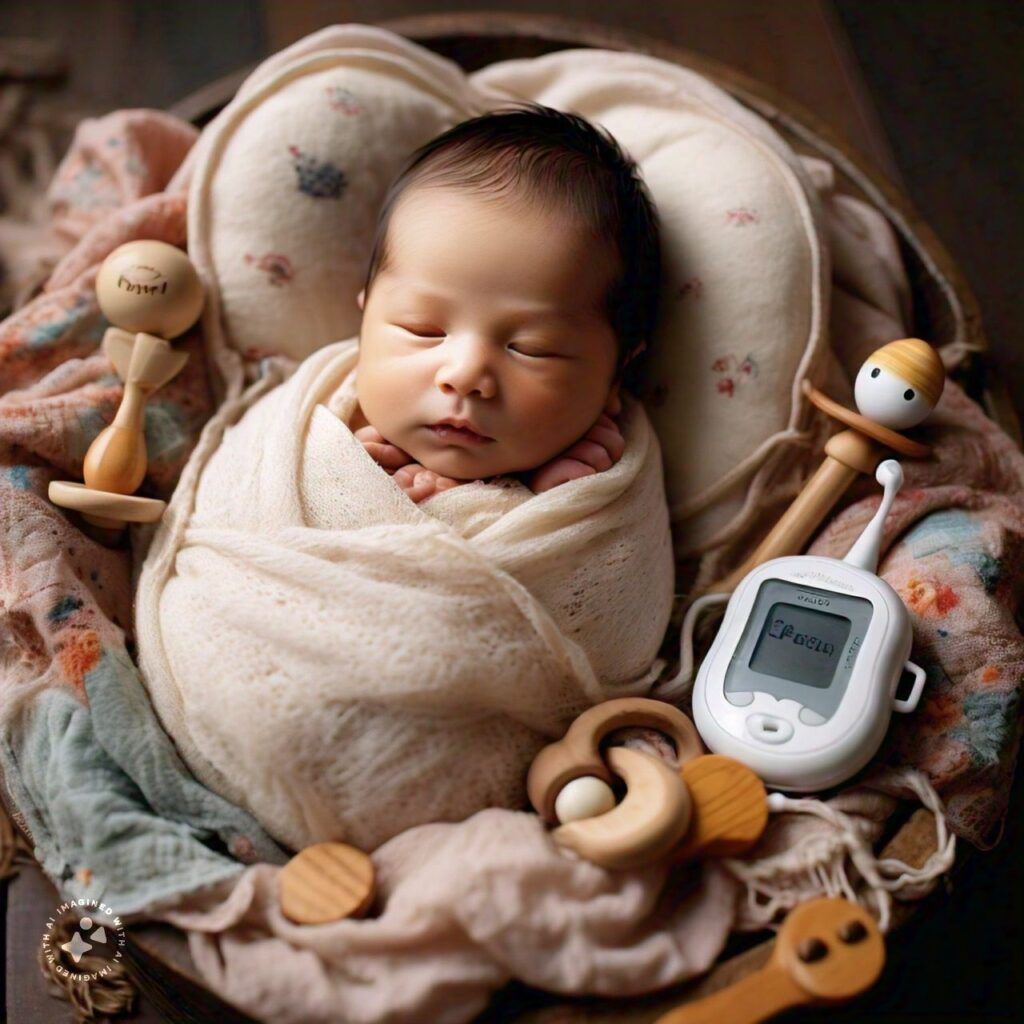As a new parent, you’ve likely heard that newborns sleep a lot – up to 18 hours a day! But, figuring out your baby’s sleep patterns can be tough. You might find yourself dealing with frequent night wakings or trying to get a consistent routine going.
Understanding your newborn’s sleep needs and making a sleep-friendly environment are crucial. They help ensure your baby gets healthy, restful sleep.
Key Takeaways
- Newborns typically sleep 12 or more hours a day, but in short bursts of 1-2 hours at a time.
- Babies born prematurely may sleep more than those born at term.
- Following safe sleep practices, such as placing your baby on their back, can help reduce the risk of Sudden Infant Death Syndrome (SIDS).
- Establishing a calming bedtime routine can help your newborn transition to sleep more easily.
- Soothing techniques like swaddling and pacifier use may promote better sleep, but should be used with caution.
Understanding Newborn Sleep Patterns
As a parent of a newborn, it’s key to grasp the unique sleep patterns and needs of your little one. Newborns have a vastly different sleep schedule than older kids. It’s vital to understand these differences to help your baby get the rest they need for healthy growth and development.
How Much Sleep Do Newborns Need?
Newborns usually need 14 to 17 hours of sleep in a 24-hour day. Some can sleep up to 18 to 19 hours a day. But, their sleep is often broken, with them waking every couple of hours to eat. Breastfed babies may nurse every 2 to 3 hours, while bottle-fed babies may eat every 3 to 4 hours.
It might take a few weeks for a newborn’s brain to learn the difference between night and day. This leads to their sleep being spread out in smaller chunks during the day and night, especially in the first few months.
Each newborn sleep cycle includes both active and quiet sleep, lasting about 40 minutes. During active sleep, newborns move a lot and make noises. In quiet sleep, they are still, with deep and regular breathing.
“Newborns typically wake several times a night for feeds, and it may take a few months for them to start sleeping through the night.”
By around 3 months old, babies might sleep longer at night, like 4 to 5 hours. But they still usually wake at least once each night. Premature babies may face extra sleep challenges and need special guidance on their sleep schedules.
Creating a Conducive Sleep Environment
Creating a safe and comfy sleep area is key for your newborn’s health. Always put your baby on their back to sleep on a firm, flat surface like a crib or bassinet with a fitted sheet. Keep the room at a comfy temperature, between 68 to 72 degrees Fahrenheit. Avoid using soft bedding, pillows, or loose blankets that could be a suffocation risk.
According to the latest crib safety guidelines, things like positioners, bumpers, and pillows can block an infant’s nose and mouth, leading to suffocation. Research shows that elevating a baby more than 10 degrees can harm their oxygen flow. So, it’s crucial to make sure the sleeping area is flat and firm.
Think about using white noise for newborns, like a sound machine, to soothe your baby and help them sleep better. Studies show that white noise can be a great tool in making a peaceful sleep area for newborns.
| Statistic | Significance |
|---|---|
| Approximately 3,500 infants die annually from sleep-related infant deaths in the United States. | Shows how important it is to make a safe sleep area to prevent these sad events. |
| Most deaths related to Sudden Unexpected Infant Death Syndrome (SUIDS) occur between 1 month and 4 months of age. | Points out the critical time when newborns are most at risk, stressing the need for careful safe sleep habits from the start. |
| Breastfeeding is linked to a lower risk of Sudden Infant Death Syndrome (SIDS) for at least the first 6 months. | Urges parents to think about breastfeeding as a way to boost newborn safety and health. |
By making a safe sleep environment for your newborn, you can make sure they’re comfy and lower the risk of sleep issues. A peaceful and suitable sleep area is key for your baby’s healthy growth and overall well-being.

Establishing a Bedtime Routine
Creating a consistent baby sleep routine can change the game for you and your newborn. A calming bedtime routine helps your little one link certain activities with sleep. This makes falling asleep easier. Think about adding soothing things like a warm bath, gentle rocking, reading, or singing a lullaby.
Tips for a Calming Routine
If you’re breastfeeding and sleep is an issue, feed your baby at the start of the routine. This way, they won’t depend on nursing to fall asleep. Also, a quiet and dimly lit room tells your newborn it’s time to sleep.
- Experts suggest including four main components in a bedtime routine: nutrition, hygiene, communication, and physical contact.
- Bath time is a key part of bedtime routines, even though babies don’t need a bath more than three times a week.
- Reading a bedtime story helps babies learn new words and boosts language skills.
- Singing a lullaby helps a sleepy baby fall asleep.
- Playing lullabies or classical music soothes babies to sleep.
- Baby massage meets the need for touch and calms your baby before bed.
Remember, being consistent is crucial when setting a baby sleep routine. Adjusting the routine as your baby grows is key. This ensures a peaceful night’s sleep for everyone.

“Establishing a bedtime routine as early as six weeks old can help in creating consistency and predictability for the baby.”
Newborn Sleep
Newborns may wake up a lot at night, but you can help them sleep better. Try not to overstimulate them during feedings and diaper changes. Keep the room dark and quiet. This helps your baby sleep better.
As your baby gets older, teach them to self-soothe. This means they can fall asleep on their own more easily. It helps them sleep better with less help from you.
But, be ready for sleep regressions. These are times when your baby’s sleep patterns change. It’s normal and you should stay patient and consistent.
Newborns sleep 14 to 17 hours a day. They wake up for just 30 minutes to an hour at a time. They need to eat every two to four hours, day and night. By 6 months, some babies sleep seven to eight hours at night. But, don’t put babies on a strict sleep schedule until they’re about 3 to 4 months old.
There are ways to help your newborn sleep better. Follow safe sleep rules, use a massage or white noise, swaddle them, and keep the room at a good temperature. Well-rested parents can help their babies sleep better. It’s important to check on your baby’s needs and comfort them when they cry at night.
At 4 to 6 months, you might think about sleep training. This can include the Ferber method or gradual extinction. These methods help babies learn to sleep through the night. But, talk to your pediatrician to find the best method for your family.
Remember, every baby is unique. It might take time to find the right sleep strategies for your baby. With patience and consistency, you can help your newborn develop good sleep habits. This will help your whole family sleep better.
Soothing Techniques for Better Sleep
As a new parent, you might wonder how to help your newborn sleep better. Luckily, there are many soothing techniques you can try. These can help your little one sleep more soundly.
Swaddling and Pacifiers
Swaddling, or wrapping your baby snugly in a light blanket, is one effective technique. It gives them a sense of security and comfort. This makes them feel safe and relaxed. But, stop swaddling when your baby starts trying to roll over, usually around 4 months old.
Using a pacifier can also help. It can lower the risk of Sudden Infant Death Syndrome (SIDS). Wait a few weeks before using one if you’re breastfeeding to make sure your baby has a good latch.
Additional Soothing Methods
- Rocking your baby gently can calm them and help them fall asleep.
- A white noise machine can make a soothing sound. This sound can block out other noises that might wake your baby.
- Shushing or making soft sounds can also soothe your newborn and help them sleep better.
Remember, every baby is unique. It might take some trying to find the best soothing techniques for your baby. With patience and effort, you can help your newborn sleep more peacefully and restfully.

When to Seek Professional Help
As a new parent, you might have many questions about your baby’s sleep. It’s normal to wonder if everything is okay. But, some signs might mean you should talk to your pediatrician.
If your newborn seems excessively fussy and nothing helps, they might have reflux or colic. Also, if they have trouble waking up or don’t want to eat, it could be a health issue.
Always ask your child’s healthcare provider if you have questions or worries about your newborn’s sleep habits and overall wellbeing. They can offer great advice and support. This ensures your baby gets the rest they need for healthy growth.
When to See a Doctor
- Your newborn is excessively fussy and soothing techniques aren’t working
- Your baby has difficulty waking up or appears disinterested in feeding
- Your newborn’s sleep patterns are causing concerns about their overall health and wellbeing
“Recognizing when to seek professional help for your newborn’s sleep can make all the difference in ensuring their healthy development and your family’s peace of mind.”
Remember, your pediatrician is there to support you and your baby. By working together, you can solve any newborn sleep concerns. This helps your little one get the rest they need.
Conclusion
Creating healthy sleep habits for your newborn is both tough and rewarding. By learning about their sleep patterns and making a good sleep space, you can help your baby and yourself sleep better. Be patient and flexible, as each baby is special, and their sleep needs can change often. With the right methods and support, you can make the early months of caring for a newborn easier and get more restful nights.
This article showed how crucial newborn sleep tips are for their brain growth, behavior, and your health. Studies found that sleep issues in young kids can be linked to problems later on. But, good sleep habits can boost a baby’s learning and growth.
Using the tips from this article, you can set your newborn on a path to healthy sleep habits that will benefit them for a long time. Remember, every baby is unique, so be patient, flexible, and open to trying different things until you find what works best for your baby.
FAQ
How much sleep do newborns need?
What is the difference between newborn and infant sleep patterns?
How can I create a safe sleep environment for my newborn?
What are some tips for establishing a calming bedtime routine?
What soothing techniques can help my newborn sleep better?
When should I consult a pediatrician about my newborn’s sleep?
Source Links
- https://kidshealth.org/en/parents/sleepnewborn.html – Sleep and Your Newborn (for Parents)
- https://www.mayoclinic.org/healthy-lifestyle/infant-and-toddler-health/in-depth/baby-sleep/art-20045014 – Expert tips to help baby sleep through the night
- https://www.stanfordchildrens.org/en/topic/default?id=newborn-sleep-patterns-90-P02632 – Newborn Sleep Patterns
- https://raisingchildren.net.au/newborns/sleep/understanding-sleep/newborn-sleep – Newborn sleep: what to expect
- https://healthier.stanfordchildrens.org/en/creating-a-safe-sleep-environment-for-your-baby/ – Creating a Safe Sleep Environment for Your Baby – Stanford Medicine Children’s Health Blog
- https://www.ncbi.nlm.nih.gov/pmc/articles/PMC2724136/ – Creating a safe sleep environment for your baby
- https://www.whattoexpect.com/first-year/sleep/baby-bedtime-routine/ – How to Establish a Bedtime Routine for Your Baby
- https://familydoctor.org/newborn-sleep-routines/ – Newborn Sleep Routines – familydoctor.org
- https://www.babycenter.com/baby/sleep/establishing-a-bedtime-routine-with-your-baby_1507759 – Night routines for babies: How to start a bedtime routine
- https://www.whattoexpect.com/first-year/newborn-sleep.aspx – Newborn and Baby Sleep Basics
- https://www.chop.edu/conditions-diseases/newborn-sleep-patterns – Newborn-Sleep Patterns | Children’s Hospital of Philadelphia
- https://www.sleepfoundation.org/baby-sleep/baby-sleep-cycle – How Your Baby’s Sleep Cycle Differs From Your Own
- https://raisingchildren.net.au/babies/sleep/settling-routines/helping-babies-sleep-settle-3-6-months – Baby sleep and settling at 3-6 months: tips
- https://www.sleepfoundation.org/baby-sleep/sleep-training – Sleep Training
- https://www.healthychildren.org/English/ages-stages/baby/crying-colic/Pages/Self-Soothing-Helping-Your-Baby-Learn-This-Life-Skill.aspx – Self-Soothing: Help Your Baby Learn This Life Skill
- https://my.clevelandclinic.org/health/articles/14300-sleep-in-your-babys-first-year – Will My Baby Ever Sleep Through the Night? All About Sleep in Your Baby’s First Year
- https://www.stanfordchildrens.org/en/topic/default?id=infant-sleep-90-P02237 – Infant Sleep
- https://takingcarababies.com/active-sleep-newborns?srsltid=AfmBOoqiqTFur0IGErrhK0dfuidFuA0qRHhfIA_TDo2mWtkU5sDyxhV3 – Active Sleep and Newborns
- https://www.ncbi.nlm.nih.gov/pmc/articles/PMC2768951/ – A Review of the Effects of Sleep During the First Year of Life on Cognitive, Psychomotor, and Temperament Development
- https://www.ncbi.nlm.nih.gov/pmc/articles/PMC5440010/ – Infant sleep and its relation with cognition and growth: a narrative review



